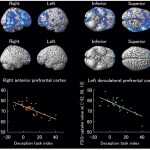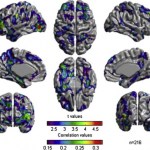Brain and Behavior
What?....
There is a slang phrase in Serbo-Croatian that means "doing nothing; being idle; wasting time", and it is "hladiti jaja", which means "cooling (one's) balls". So, if you see a guy just sitting there, clutching a beer bottle and gazing into the distance, you may ask him "Hey, man, whatcha doin'?" and he may reply " 'ladim jaja", i.e., "I'm coolin' me balls".
Well, this slang phrase, indicating a thermoregulatory behavior, has its origin in the real theromoregulatory physiology. Yes, mammals have to cool their balls. That is why mammalian testes are located outside the body inside…
What better way to celebrate Easter weekend than with an old spiritual song about the birth of Jesus? This is the gospel song Last Month of The Year -- an old Southern American Spiritual -- sung and arranged by Jackson C. Frank. This is my favorite version of the song by far, as I really like its simplicity and the minor tones to go along with it. Take a listen:
alt : Last Month of the Year.wavWell, Good Friday is when he died, and then we have the following Bible Quotes to go off of to figure out what came next:
Acts 2:24 -- But God raised him from the dead, freeing him from the agony of…
Via Tyler Cohen's Marginal Revolution comes this amusing anecdote -- and, perhaps, helpful example -- from the life of Peter Orszag, Obama's very brainy budget director. To motivate himself to train for a marathon, he somehow set up a penalty if he didn't hit his training targets: His credit card would make a contribution to a charity or cause he hated:
]"If I didn't achieve what I wanted to, a very large contribution would automatically come out of my credit card and go to a charity that I very much didn't support," Orszag says of his training strategy. "So that was a very strong motivation…
Last night was Seder night and today we had the outage, so I know this is coming late. Still, there are 26 new articles published last night and 5 new articles tonight in PLoS ONE. As always, you should rate the articles, post notes and comments and send trackbacks when you blog about the papers. You can now also easily place articles on various social services (CiteULike, Connotea, Stumbleupon, Facebook and Digg) with just one click. Here are my own picks for the week - you go and look for your own favourites:
Uncovering the Genetic Landscape for Multiple Sleep-Wake Traits:
Despite decades…
This looks like fun, but it's a bit of drive for me: Steven Schlozman will be giving a talk on the neuropsychology of zombies. He's talking about levels of activity in the brain and modeling of behavior, which could be interesting — fantasy and horror can be useful tools to get people interested in digging deeper into biology.
Where I always get stuck in any scientific examination of the entirely imaginary phenomenon of zombies, however, is the biochemistry and physiology. They just can't work. They're using meat to generate motion, but the properties of meat that can cause contraction/…
The Secret To Chimp Strength:
February's brutal chimpanzee attack, during which a pet chimp inflicted devastating injuries on a Connecticut woman, was a stark reminder that chimps are much stronger than humans--as much as four-times stronger, some researchers believe. But what is it that makes our closest primate cousins so much stronger than we are? One possible explanation is that great apes simply have more powerful muscles.
New Link Between The Evolution Of Complex Life Forms On Earth And Nickel And Methane Gas:
The Earth's original atmosphere held very little oxygen. This began to…
Neurological diseases can be strange in that they often have additional personality effects. If someone gets a cold, they sneeze a bunch but are basically the same person they were before the cold. In contrast, meningitis can include mental status and personality changes in its early stages -- including irritability and sleepiness. When a disease involves the brain, it can change who we are in addition to making us sick.
In this vein, I found this paper in the journal Brain particularly interesting. Abe et al. report that Parkinson's patients tell fewer lies than controls in a task where…
Brine-Loving Microbes Reveal Secrets To Success In Chemically Extreme Environments:
Scientists have completed the first study of microbes that live within the plumbing of deep-sea mud volcanoes in the Gulf of Mexico, where conditions may resemble those in extraterrestrial environments and early Earth. The study, which was partially funded by the National Science Foundation (NSF), was conducted in an area where clusters of seafloor vents spew mud, oil, brine and gases that support food chains independently of the Sun.
Women May Be Sniffing Out Biologically-relevant Information From Underarm…
Gene Roddenberry has often pissed me off. He didn't invent the stereotype, but he certainly crystallized it in popular culture with his Star Trek character, Mr Spock. What is the end result of intelligence and education? Why, an emotionless robot who assesses impossible probabilities instantaneously in his head and denies love and friendship. It's a caricature I run into all the time — I've lost count of the number of emails I've received informing me that True Scientists™ do not get angry about anything, and therefore everything I say is invalid. It's annoying, but mainly what it tells me is…
In any book about evolutionary anthropology it is almost obligatory to cite Charles Darwin as the person who suspected that our species was most closely related to chimpanzees and gorillas, thus anticipating our modern understanding. In his famous 1871 book The Descent of Man Darwin wrote;
In each great region of the world the living mammals are closely related to the extinct species of the same region. It is therefore probable that Africa was formerly inhabited by extinct apes closely allied to the gorilla and chimpanzee; and as these two species are now man's nearest allies, it is somewhat…
Nice four articles:
The Gears of the Sleep Clock By Allan Pack:
When people have trouble sleeping--such as, in extreme cases, shift workers--those problems are not always rooted in disturbances in circadian rhythm, argues the University of Pennsylvania's ALLAN PACK. Instead, his studies of sleep have shown that the master clock is only one player in the molecular control of sleep.
Sleep adjusts fly synapses by Bob Grant:
New findings support a controversial hypothesis about the biological role of sleep: Snoozing may be a way for the brain to clear clutter accumulated after a hard day of…
My good friend and blogfather, Orac, posted something yesterday about animal testing
in medical laboratories. I've been meaning to write something about that for a while; now
seems like a good time.
I'm not someone who thinks that being cruel to animals is no big deal. I have known
some people like that, but thankfully they're very rare, and none of them
were scientists whose work involves doing animal testing in real laboratories.
But animal testing isn't about pointless cruelty. It's about understanding things that we
simply cannot learn about in any other way. It's extremely important…
Genetic Basis For Migration In Monarch Butterflies Uncovered:
Scientists studying Eastern North American monarch butterflies (Danaus plexippus) have uncovered a suite of genes that may be involved in driving the butterflies to migrate towards Mexico for the winter. Their research describes 40 genes that are linked to the butterflies' compulsion to orientate themselves by an internal 'sun compass' and begin the 4000km journey southwards.
Steven Reppert led a team of researchers from the University of Massachusetts Medical School who performed behavioral and genetic analyses on summer and…
Single Gene Shapes the Toil of Ants' Fighter and Forager Castes:
Researchers studying the social behavior of ants have found that a single gene underlies both the aggressive behavior of the ant colony's soldiers and the food gathering behavior of its foraging caste.
The gene is active in soldier ants, particularly in five neurons in the front of their brain, where it generates large amounts of its product, a protein known as PKG. The exact amount of the protein in the ants' brains is critical to their behavior.
The article goes on talk to about correlates of PKG variation in humans....
Numerous studies have attempted to correlate general intelligence with different anatomical measures. (You might even argue that the phrenologists were working in this vein.) Likewise many studies have attempted to relate intelligence to the function of different brain regions -- using techniques like fMRI or PET scanning. However, relatively few studies have attempted to correlate general intelligence with anatomical features of particular brains regions.
This is important because we know that the brain works not as regions operating in isolation, but as a set of neural systems…
A few days ago The New York Times had a blog post up which addressed the relationship between genes & environment in shaping our behavior & choices (see Genetic Future). One of the authors even posted a follow up comment where they evinced some surprise at the bile of the responses. I have to say that some people are naive; statistical sciences are a good reflection of the tenor of society. If you say a trait is 50% heritable, that is a statement of fact, but individuals will "spin it" however they want to based on their own outlook and the preferences of their target audience. Years…
It might not seem like the an 8 inch long leopard slug could put on an amazing sex show. After all, they can be real slimeballs. But actually, these hermaphroditic gastropod mollusks' sexual behavior is quite... well... beautiful.
video link:
The foreplay for the fertilization, which consists of a lot of licking and nibbling, can last up to 2.5 hours. That's about 793 days in slug time. And when it's all over with, both slugs (slowly) retreat to cold and damp hideaways in order to lay their respective sets of eggs.
If you're thinking about eating these monster slugs, please don't.…
Here's another common question I get at my book talks:
"Is there a difference between the male and female brain when it comes to decision-making? Are women really more intuitive? Which sex is the better decider?"
While there are certainly relevant differences between the male and female brain - that wash of sex hormones in the womb can have significant effects - I think it's important to begin by emphasizing the profound irrelevance of gender in most experimental studies of decision-making.
Let's begin with that perdurable cliche about female intuition. My own hunch is that women got…
There are 13 new articles in PLoS ONE today. As always, you should rate the articles, post notes and comments and send trackbacks when you blog about the papers. You can now also easily place articles on various social services (CiteULike, Connotea, Stumbleupon, Facebook and Digg) with just one click. Here are my own picks for the week - you go and look for your own favourites:
Expert Financial Advice Neurobiologically 'Offloads' Financial Decision-Making under Risk:
Financial advice from experts is commonly sought during times of uncertainty. While the field of neuroeconomics has made…
Brad Delong summarizes an important point when it comes to evaluating whether or not the latest plan to rescue banks from their own toxic assets is going to work. In this interesting post, he contrasts his own tepid support for the plan with Paul Krugman's pessimistic opposition:
I think the private-sector players in financial markets right now are highly risk averse--hence assets are undervalued from the perspective of a society or a government that is less risk averse. Paul judges that assets have low values beceuse they are unlikely to pay out much cash.
I think one way to evaluate these…


